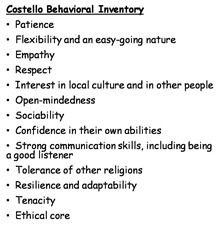 Why do people seek out expatriate opportunities?
Why do people seek out expatriate opportunities?
I think that there are a lot of positive reasons: surveys often cite people wanting to experience foreign cultures, expand their travel opportunities, further their career or academic development, or just seeking novelty and adventure. A substantial number have married foreign nationals.
Still, I have a nagging suspicion that people firmly attached to their home communities or satisfied with their lives are unlikely to make the break to expatriate living. Does this imply that we’re more likely to feel alienated or dissatisfied with life prior to leaving?
“I was left with a feeling – a restlessness, a yearning for a place to call home…which could be the homeland we long for and which lies truly nowhere, or elsewhere, or everywhere, or perhaps only somewhere deep within ourselves.”
“I need to throw away my cup of sorrows and forget: and the best way to do that, apparently, is to join the French Foreign Legion.”
The literature isn’t very helpful. Studies of successful expatriate managers (Jordan 1998) and behavioral inventories (Costello 2005) focus on adaptability rather than motivations.:
Caligiuri (2000) has recently studied expatriate adjustment using the “Big Five” personality traits (Goldberg, 1993 defines them as those which account for a majority of the variance in personality measures):
- Extroversion: The degree to which a person is talkative and sociable and enjoys social gatherings.
- Agreeableness: The tendency of a person to be interpersonally altruistic and co-operative.
- Conscientiousness: The degree to which a person is strong-willed, determined and attentive.
- Neuroticism: Negative emotional stability, showing characteristics of nervousness, moodiness and a temperamental nature.
- Openness to experience: The extent to which a person is
aesthetically sensitive and aware of inner feelings and has an active imagination
Caligiuri’s results suggest that Extroversion, Agreeableness, and Emotional Stability are traits most positively related to expatriate success. Yet I would think that they would also be those most related to success in the home environment.
So, my question remains:
What are the personality traits that distinguish those who sojourn from those who stay at home?
In the Big Five context, are they people who are more dissatisfied (neurotic, perhaps, but wouldn’t that also make them less successful abroad?), or people who might have the easiest transition (openness, but why would they leave home?) .
Or perhaps some secondary characteristic, like confidence and curiosity, that isn’t part of the Big Five?
Or perhaps it’s determined by social context rather than personality type?
Note: If you want to read further, Rutgers maintains a public archive of Dr. Caligiuri’s papers and other related HR topics.







